COLUMBUS, Ohio — Community gardens, mobile fresh produce trucks, farmers markets, more full-service grocery stores. These are just some of the options communities are turning to as a way to combat food imbalance where they live.
Columbus Public Health identified 42 neighborhoods where a food imbalance exists. Places like Glen Echo, South Linden, University, Mount Vernon, Olentangy High Bluffs, Milo-Grogan and Central Hilltop neighborhoods to name a few.
CPH said these areas are not food deserts, rather they have been identified as "locations where accessing less nutritious food may be the easiest option."
Northland was another neighborhood identified where a food imbalance exists. Giant Eagle on East Dublin Granville Road closed six years, leaving the nearest grocery store about three miles away at a Kroger on Morse Road.
Caitlyn Smith Elkins, a Northland homeowner, says she knows what it's like to live in an area where access to nutritious food is a chore.
“Not having to run 15 minutes to the grocery store to get a dozen eggs would be great,” she says.
Jenny Leal is a member of Elevate Northland. She wonders what it will take for someone to provide more food choices in the neighborhood.
“To be frank, we’ve always felt a little bit forgotten up here in Northland,” she said.
Smith Elkins, a mother of two, says the fewer options to shop for food, the less choices and fewer options to comparison shop she has.
“Just having more options, that’s one thing. When we do go to the grocery store we are kind of limited. We are price gauged by the grocery store that is close by,” Smith Elkins said.
A local company called Local Matters started a veggie van to try and solve the problem. The company provides low cost food delivery across the city and serves those who use SNAP benefits. You can read more about Local Matters here.

